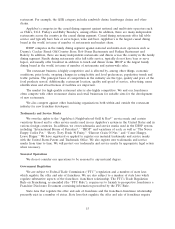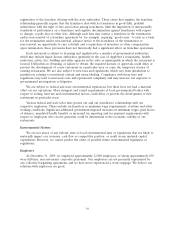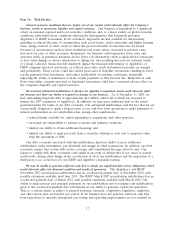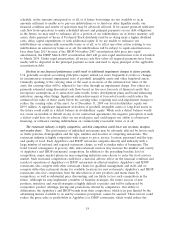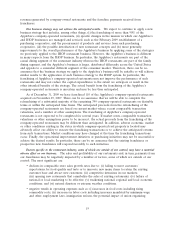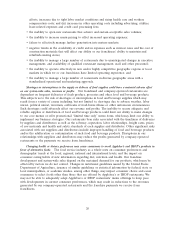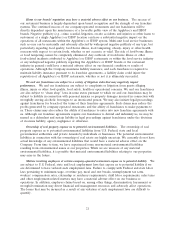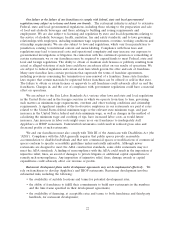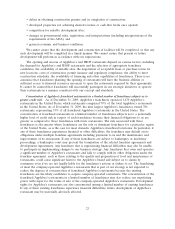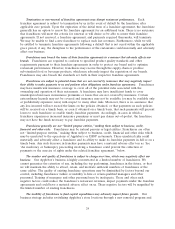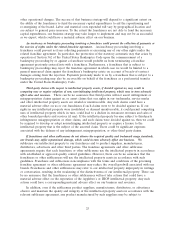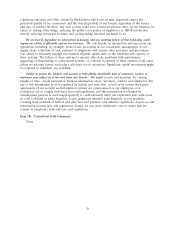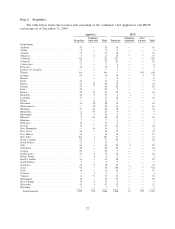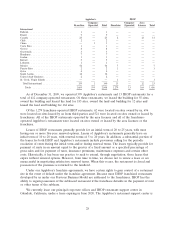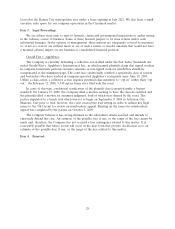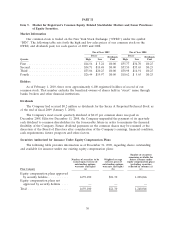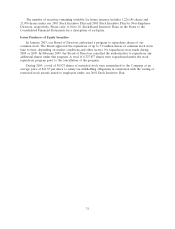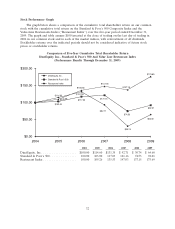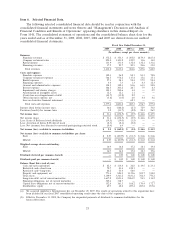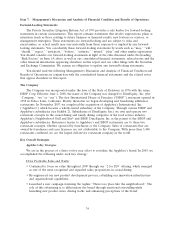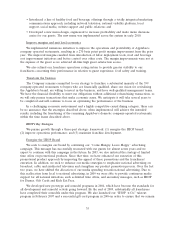IHOP 2009 Annual Report Download - page 44
Download and view the complete annual report
Please find page 44 of the 2009 IHOP annual report below. You can navigate through the pages in the report by either clicking on the pages listed below, or by using the keyword search tool below to find specific information within the annual report.other operational changes. The success of that business strategy will depend to a significant extent on
the ability of the franchisees to fund the necessary capital expenditures to aid the repositioning and
re-energizing of the brand. Labor and material costs expended will vary by geographical location and
are subject to general price increases. To the extent the franchisees are not able to fund the necessary
capital expenditures, our business strategy may take longer to implement and may not be as successful
as we expect, which could have a material adverse effect on our business.
An insolvency or bankruptcy proceeding involving a franchisee could prevent the collection of payments or
the exercise of rights under the related franchise agreement. An insolvency proceeding involving a
franchisee could prevent us from collecting payments or exercising any of our other rights under the
related franchise agreement. In particular, the protection of the statutory automatic stay that arises by
operation of Section 362 of the United States Bankruptcy Code upon the commencement of a
bankruptcy proceeding by or against a franchisee would prohibit us from terminating a franchise
agreement previously entered into with a franchisee. Furthermore, a franchisee that is subject to
bankruptcy proceedings may reject the franchise agreement in which case we would be limited to a
general unsecured claim against the franchisee’s bankruptcy estate on account of breach-of-contract
damages arising from the rejection. Payments previously made to us by a franchisee that is subject to a
bankruptcy proceeding may also be recoverable on behalf of the franchisee as a preferential transfer
under the United States Bankruptcy Code.
Third-party claims with respect to intellectual property assets, if decided against us, may result in
competing uses or require adoption of new, non-infringing intellectual property, which may in turn adversely
affect sales and revenues. There can be no assurance that third parties will not assert infringement or
misappropriation claims against us, or assert claims that our rights in our trademarks, service marks
and other intellectual property assets are invalid or unenforceable. Any such claims could have a
material adverse effect on us or our franchisees if such claims were to be decided against us. If our
rights in any intellectual property were invalidated or deemed unenforceable, it could permit competing
uses of intellectual property which, in turn, could lead to a decline in restaurant revenues and sales of
other branded products and services (if any). If the intellectual property became subject to third-party
infringement, misappropriation or other claims, and such claims were decided against us, then we could
be required to develop or adopt non-infringing intellectual property or acquire a license to the
intellectual property that is the subject of the asserted claim. There could be significant expenses
associated with the defense of any infringement, misappropriation, or other third party claims.
If franchisees and other sublicensees do not observe the required quality and trademark usage standards,
our brands may suffer reputational damage, which could in turn adversely affect our business. We
sublicense our intellectual property to our franchisees and to product suppliers, manufacturers,
distributors, advertisers and other third parties. The franchise agreements and other sublicense
agreements require that each franchisee or other sublicensee use the intellectual property in accordance
with established or approved quality control guidelines. However, there can be no assurance that the
franchisees or other sublicensees will use the intellectual property assets in accordance with such
guidelines. Franchisee and sublicensee noncompliance with the terms and conditions of the governing
franchise agreement or other sublicense agreement may reduce the overall goodwill associated with our
brands. Franchisees and other sublicensees may refer to our intellectual property improperly in writings
or conversation, resulting in the weakening of the distinctiveness of our intellectual property. There can
be no assurance that the franchisees or other sublicensees will not take actions that could have a
material adverse effect on the reputation of the Applebee’s or IHOP intellectual property. Any such
actions could have a corresponding material adverse effect on our business and revenues.
In addition, even if the sublicensee product suppliers, manufacturers, distributors, or advertisers
observe and maintain the quality and integrity of the intellectual property assets in accordance with the
relevant sublicense agreement, any product manufactured by such suppliers may be subject to
25


